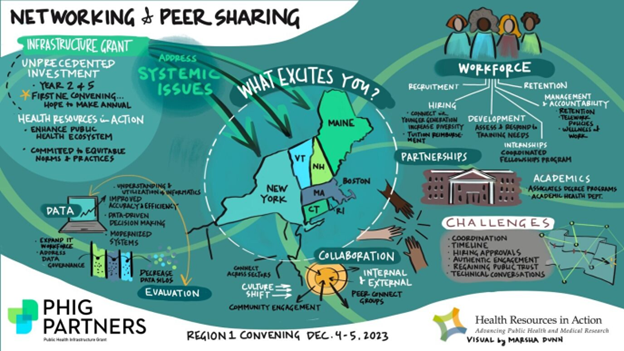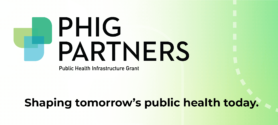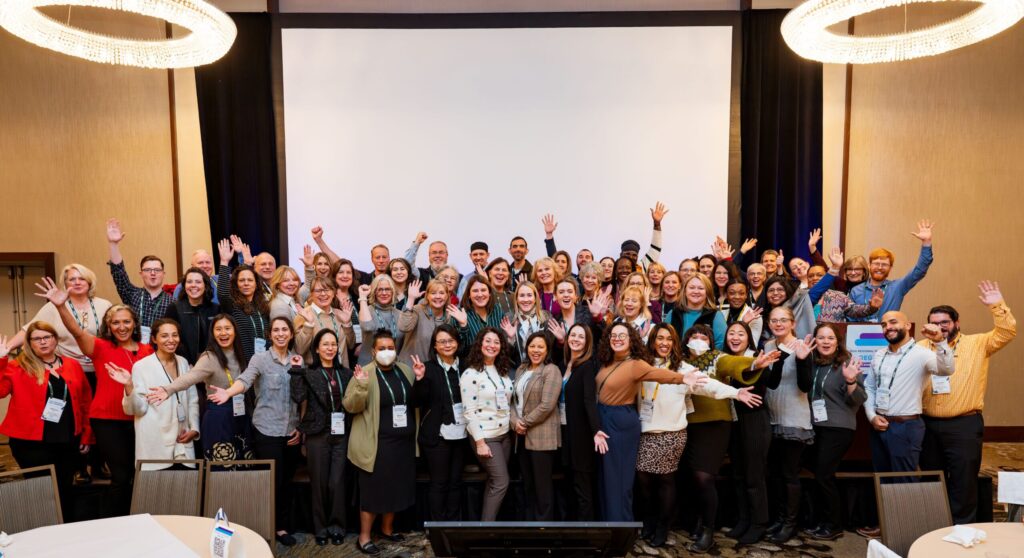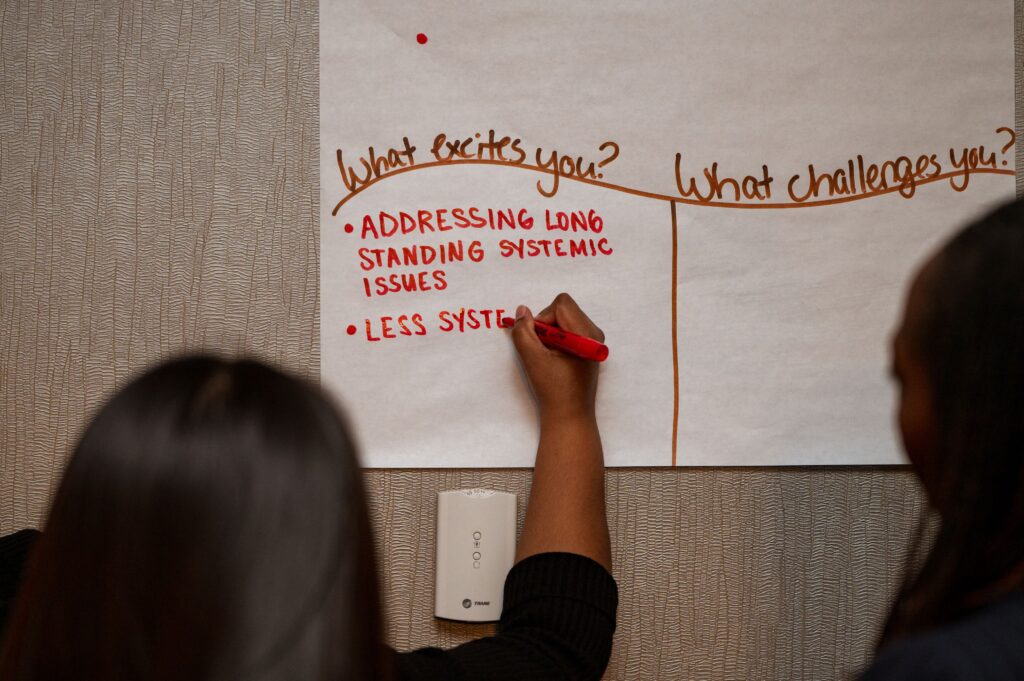“The expertise is in the room”: Region 1 Hub Convening Highlights “People Power” Behind PHIG
- By: Chloe Lake
- Date
“I think everyone left the convening feeling a sense of camaraderie across Region 1 and excitement to keep these peer support networks flourishing. The convening built a strong foundation for communities of practice that began forming organically in the room, which could only be achieved by an in-person event like this.”
Kelly Danckert, HRiA Program Manager and technical assistance lead for New Hampshire, Vermont, and Maine
On December 4-5, 2023, Health Resources in Action (HRiA), the National Network of Public Health Institutes’ regional hub for New England, hosted a Public Health Infrastructure Grant (PHIG) Hub Convening for Region 1 in Portland, Maine. Over 70 people attended, half of whom represented PHIG recipient health departments based in Massachusetts, Boston, Rhode Island, Connecticut, Maine, New Hampshire, Vermont, and, from region 2, New York. Health department staff were joined by representatives from the PHIG National Partners (Association of State and Territorial Health Officials, Public Health Accreditation Board, NNPHI) and regional technical assistance providers (New England Public Health Training Center, Vermont Public Health Institute). Of note, the Public Health Management Corporation, NNPHI’s PHIG Hub for Regions 2 & 3, stepped outside of their region to attend and support health department staff from New York.
This convening was the fifth within a larger series coordinated by NNPHI. These convenings offer PHIG recipients in-person platforms to receive hands-on technical assistance, exchange insights, and build relationships with their hub, national PHIG partners and technical assistance providers, and other health departments in their region.
CONVENING HIGHLIGHTS
During the planning stages for this event, the team at HRIA held a virtual meeting with PHIG recipients in their region to co-create the agenda. This collaborative process helped ensure that convening content was tailored to meet the needs and interests of the PHIG recipients in attendance. As a result, the convening prioritized giving Region 1 recipients what they craved: an opportunity to simply talk, get to know one another, and work through challenges face-to-face. “There are so rarely spaces for New England health departments to sit in community with one another, share their challenges, and find common ground” said Kate Holmes, Senior Manager at HRiA, continuing, “This convening provided a unique opportunity for shared learning, connection, and problem solving.”
Other highlights included:
- An interactive welcome reception asked each health department to share their key activities and to answer two questions: what excites you? What challenges you? One recipient wrote “everything!” as a response to both. Many others affirmed this response, delving deeper into the ways that PHIG is both an exciting and challenging opportunity. These opening conversations helped break the ice for transparent, honest dialogue through the convening. Marsha Dunn, a graphic scribe local to Maine, helped capture these conversations by creating a visual snapshot of what grantees shared:

- A keynote address by Dawn Hunter (Network for Public Health Law) emphasized the importance of storytelling and narrative in public health work, setting the tone for the next day’s barrier-busting sessions and communication workshop. These sessions prompted attendees to consider how their PHIG work fits into a broader public health context, and encouraged them to devote time and resources to strategic communications.
- Breakouts sessions focused on leveraging technical assistance offerings to overcome barriers across each aspect of the Public Health Infrastructure Grant, with specific breakouts devoted to public health accreditation, workforce supports, health and racial equity, community engagement and partnership, and evaluation.
CONVENING OUTCOMES
Not only did the convening work to build relationships between attendees, it offered tangible insights into how technical assistance offerings can best serve health departments. Geri Medina, HRiA Senior Program Manager and Technical Assistance Lead for Boston Public Health Commission, expanded on that, saying, “From the Hub’s standpoint, it was energizing to observe grantees engage in insightful and candid discussions and outline practical, actionable measures to overcome challenges. The convening provided an excellent opportunity for our Hub staff to connect face-to-face with recipients and lead technical assistance workshops, offering a deeper understanding of the breadth of support available to help grantees bring their projects to fruition.”
“EVERYTHING was helpful. Probably the best convening I’ve attended in several years.”
– Attendee response, post-event survey
Throughout the convening, it was clear that creating space for collaboration is necessary to support innovation in public health throughout and beyond the grant period. Ben Wood, Senior Director of Policy and Practice at HRiA, reflected on the people driving PHIG work forward, sharing, “The hard work of fixing deeply engrained practices that shape how we think about who the public health workforce is, and how we value and support health department staff is just that: hard. But we are up to the challenge – it’s clear that the expertise is in the room. I have no doubt that the people doing this work in Region 1 have the necessary creativity, sense of purpose, and commitment to equity and system-level problem-solving to make PHIG a truly transformative initiative.”
LEARN MORE
More information and resources related to the Public Health Infrastructure Grant can be found at PHInfrastructure.org. More information about Health Resources in Action can be found at HRIA.org.
This work is supported by funds made available from the Centers for Disease Control and Prevention (CDC) of the U.S. Department of Health and Human Services (HHS), National Center for STLT Public Health Infrastructure and Workforce, through OE22-2203: Strengthening U.S. Public Health Infrastructure, Workforce, and Data Systems grant. The contents are those of the author(s) and do not necessarily represent the official views of, nor an endorsement, by CDC/HHS, or the U.S. Government.



 Subscribe To Our Communications
Subscribe To Our Communications